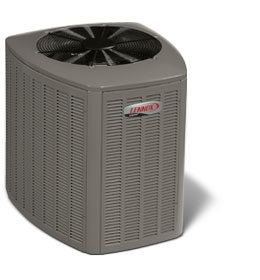Frequently Asked Questions: What is a Heat Pump?
The simplest answer is that a heat pump is an air conditioner that heats and cools. Wait…what? It’s true. Some super-genius figured out how to use the refrigeration process to both HEAT and COOL a space within the same unit. How cool is that?!?

There are different types of heat pumps, but the outside units all basically look just like condensers from a regular split AC system. The inside units vary in appearance – they can be wall or ceiling-mounted, or look a little like a furnace or air handler. They can be ductless or a traditional ducted system. They can run with air or water or even be geothermal. The thing that makes all heat pumps different from a regular AC unit is the reversing valve. The reversing valve is what is responsible for the switcheroo (yes, that’s the technical term) that re-routes refrigerant so that instead of taking heat OUT of a space, it puts it IN the space.
Let’s get into a little Refrigeration 101…One of the first things you should know about the refrigeration process is that an AC unit doesn’t actually cool by blowing cool air into a space, it works by REMOVING HEAT from the space. Refrigerant (often called “freon”) is used to absorb heat from one place (inside a room, fridge, freezer, etc.) and relocate it somewhere else, usually outside. The typical AC system has an indoor unit (usually called the evaporator, fan coil, indoor coil or air handler) that absorbs the heat from the room, and an outdoor unit (condenser or outdoor coil) that releases the heat to the outside. A heat pump uses a reversing valve to – you guessed it! – reverse this process, making the outside condenser able to absorb heat and inside evaporator able to release the heat inside so that it can heat the space. So it can heat or cool, depending on which way the reversing valve is turned. Pretty great right? A traditional rooftop unit or split AC unit can’t do that. Only a heat pump can.
The graphic below is an illustration of how the reversing valve changes the flow of refrigerant in the heating vs. cooling processes. It essentially flip-flops the purposes of the evaporator and condenser depending on which way you want to move heat. Click on the image to see larger.
There are some major advantages to using a heat pump, including:
- One unit does it all – both cooling and heating – instead of two separate units like a boiler and an AC unit. So it’s cheaper upfront because there’s less equipment and labor to install.
- You do not have to use or purchase fossil fuels like oil, gas or propane to heat your space since it uses refrigerant to heat and cool. All you need is some electricity to run the compressor, and in some cases, auxiliary heat (see below).
One major downside:
Heat pumps work spectacularly in very warm and moderate climates in both cool and heat modes. However, in very cold climates, when temperatures are near to zero or, heaven forbid, subzero, heat pumps have virtually no outside heat to absorb, so they need to have a backup source of heat, usually electric heat. This is not a concern if winter is warm-ish and/or electric rates are reasonable. However, if you live in New England like I do, you know that has not been the case this year.
With record low temperatures, record snow falls keeping outside condensers buried and incapacitated, and electric rates climbing this year at alarming rates (30-40% in some areas), this winter is a bad winter to own a heat pump.
This is not to say that heat pumps are ineffective in cold climates like New England, but they should be evaluated carefully and compared with other options. The technology is super-cool, but it may or may not be right for your particular application. To find out if a super-cool heat pump is right for you, give us a call.

